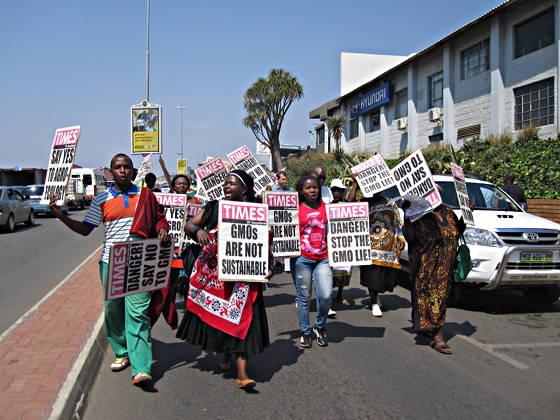Latest Resources

2 August 2024
The decline of FISPs in Malawi – debt, corruption and hunger
What future for smallholder farmers and realising agroecology?

8 July 2019
Seed and gene banks play a critical role in conserving and sharing indigenous crop seeds
On a trip to Harare for partnership exploration meetings, the African Centre for Biodiversity visited the Genetic Resources and Biotechnology Institute of Zimbabwe. Gene banks such as these are primarily established to conserve the genetic resources that form the basis for all food production. Seed collections start at the level of community seed banks and […]

28 March 2019
Cyclone Idai’s warning – Shift to agroecological systems that work with nature or suffer more dev...
Ranked as one of the worst tropical storms on record to hit Africa, Cyclone Idai made landfall in Beira on Thursday 15 March, before lacerating its way across central Mozambique and then on towards neighbouring Malawi and Zimbabwe. Heavy rains, flooding and storm damage has resulted in devastation on a vast scale. It is estimated […]

7 December 2018
Mark Lynas slammed for exploiting African farmers’ images to promote GMOs
African farmers are demanding that Lynas cease using their images in his GMO promotionals; Lynas’s mischief-making may have triggered Tanzania’s ending of GMO field trials. Report: Claire Robinson, GMWatch and Mariam Mayet, African Centre for Biodiversity. The British pro-GMO activist Mark Lynas has angered African farmers over his mis-use of their images on the internet […]

9 November 2018
Release of risky GM mosquitoes in Burkina Faso highly unethical
Press Release issued by African Centre for Biodiversity, Third World Network and GeneWatch UK Johannesburg, 9 November 2018 Release of risky GM mosquitoes in Burkina Faso highly unethical Risky genetically modified (GM) “male-sterile” mosquitoes are due to be released in the very near future, in Burkina Faso by the Target Malaria research consortium. However, Target […]

10 September 2018
Report from SADC regional farmer speak out on farm input subsidy programmes
Rural Women’s Assembly (RWA) and African Centre for Biodiversity (ACB) jointly hosted a meeting of farmers and civil society organisations (CSOs) in August 2018 to share views and experiences on farm input subsidy programmes (FISPs) and public sector support for agroecology in the region. About 140 participants from Namibia, South Africa, Zimbabwe, Mozambique, Zambia, Malawi, […]

26 June 2018
WEMA’S Bt Maize & Fall Armyworm Africa claims are unscientific and unsubstantiated
Press Release from the African Centre for Biodiversity Johannesburg, June 27 A new research paper BT Maize and the Fall Armyworm in Africa: Debunking industry claims published by the African Centre for Biodiversity (ACB) today, debunks unsubstantiated and unscientific claims made by the biotech machinery, especially the Water Efficient Maize for Africa (WEMA) Project, that […]

9 February 2018
Press Release: No benefit to imminent release of risky GM mosquitoes in Burkina Faso
Genetically modified (GM) “male-sterile” mosquitoes are due to be released in Burkina Faso this year by the Target Malaria research consortium. However, Target Malaria acknowledges that there are no benefits to the proposed GM mosquito release. The project is set to apply for a permit to make an open release of 10,000 GM Anopheles gambiae […]

8 February 2018
Briefing Paper: GM Mosquitoes in Burkina Faso
In this briefing paper ACB, TWN and GeneWatch UK discuss that genetically modified (GM) mosquitoes were exported from Imperial College in London to Burkina Faso in November 2016. They are currently in “contained use” facilities in Bobo-Dioulasso, and are being used in experiments by a research consortium called Target Malaria. However, these GM mosquitoes are […]

18 October 2017
The GMO crisis in Swaziland
Swaziland is under enormous pressure to introduce genetically modified organisms (GMOs) into the country’s farming system. This pressure is coming not only from Monsanto but also from farmers and some sections of the public who have been fed a great deal of misinformation and hype by the pro-biotech machinery. The farmers, acting on incomplete and […]
